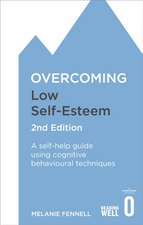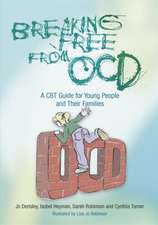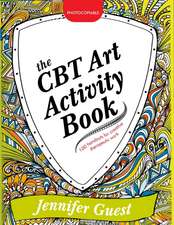Oxford Guide to Metaphors in CBT: Building Cognitive Bridges: Oxford Guides to Cognitive Behavioural Therapy
Autor Richard Stott, Warren Mansell, Paul Salkovskis, Anna Lavender, Sam Cartwright-Hattonen Limba Engleză Paperback – 13 mai 2010
Preț: 404.44 lei
Preț vechi: 470.01 lei
-14% Nou
Puncte Express: 607
Preț estimativ în valută:
77.40€ • 84.04$ • 65.01£
77.40€ • 84.04$ • 65.01£
Carte tipărită la comandă
Livrare economică 11-17 aprilie
Livrare express 15-21 martie pentru 72.61 lei
Preluare comenzi: 021 569.72.76
Specificații
ISBN-13: 9780199207497
ISBN-10: 0199207496
Pagini: 260
Dimensiuni: 156 x 234 x 15 mm
Greutate: 0.4 kg
Editura: Oxford University Press
Colecția OUP Oxford
Seria Oxford Guides to Cognitive Behavioural Therapy
Locul publicării:Oxford, United Kingdom
ISBN-10: 0199207496
Pagini: 260
Dimensiuni: 156 x 234 x 15 mm
Greutate: 0.4 kg
Editura: Oxford University Press
Colecția OUP Oxford
Seria Oxford Guides to Cognitive Behavioural Therapy
Locul publicării:Oxford, United Kingdom
Recenzii
'Oxford Guide to Metaphors in CBT: Building Cognitive Bridges is a remarkable, memorable, and continually fascinating book, one that will be on my repeated reference list for Year to come.'Robert Leahy, Clinical Professor of Psychology in Psychiatry at Weil-Cornell University Medical College, USA
'I came away from Reading this book with a deeply enriched appreciation of the value of metaphors that will significantly impact on my clinical work. This is a book of Wisdon and great practical value that therapists of all backgrounds can benefit from. Undoubtedly destined to become a classic, and metaphorically speaking "a bright star to guide us."'Paul Gilbert, Professor of Clinical Psychology, University of Derby, UK
'This is a great contribution to the cognitive therapy literature, which will be welcomed by both students and experienced practitioners in the field. A book full of wisdom and humour, it shows how the deepest aspects of human language can reach across the apparent divide between therapist and patient towards a shared understanding that transforms live.'Mark Williams, Professor of Clinical Psychology, University of Oxford, UK
'The Oxford Guide to Metaphors in CBT is a truly exciting book, breaking much new ground in a very accessible way, and providing a fascinating theoretical background. The use of pictures is particularly engaging. This is a book I shall turn to again and again, and it is easy to imagine how the material could be shared with clients with different disorders, to enhance engagement, formulation and change.'Ann Hackman, University Department of Psychiatry, Oxford, and Oxford Cognitive Therapy Centre, UK
This was a thought-provoking book for me. For those who practice CBT, it provides a rich resource of metaphors to use in sessions with patients. Being organized by disorder makes it easily applicable to specific patients and as much a book to read as one to use as a reference. For analysts or those who practice psychodynamic therapy, it not only provides ideas of how to discuss illnesses with patients through metaphors, but it also forces one to think about the nature of therapeutic action, the many uses of metaphors with patients, and the nature of collaboration. For any therapist, it also gives a view into the evolving nature of cognitive behavioral therapy, with its many emerging branches and potential for them to either enrich each other as they currently are, or fight for hegemony, which has scarred the history of psychoanalysis.
'I came away from Reading this book with a deeply enriched appreciation of the value of metaphors that will significantly impact on my clinical work. This is a book of Wisdon and great practical value that therapists of all backgrounds can benefit from. Undoubtedly destined to become a classic, and metaphorically speaking "a bright star to guide us."'Paul Gilbert, Professor of Clinical Psychology, University of Derby, UK
'This is a great contribution to the cognitive therapy literature, which will be welcomed by both students and experienced practitioners in the field. A book full of wisdom and humour, it shows how the deepest aspects of human language can reach across the apparent divide between therapist and patient towards a shared understanding that transforms live.'Mark Williams, Professor of Clinical Psychology, University of Oxford, UK
'The Oxford Guide to Metaphors in CBT is a truly exciting book, breaking much new ground in a very accessible way, and providing a fascinating theoretical background. The use of pictures is particularly engaging. This is a book I shall turn to again and again, and it is easy to imagine how the material could be shared with clients with different disorders, to enhance engagement, formulation and change.'Ann Hackman, University Department of Psychiatry, Oxford, and Oxford Cognitive Therapy Centre, UK
This was a thought-provoking book for me. For those who practice CBT, it provides a rich resource of metaphors to use in sessions with patients. Being organized by disorder makes it easily applicable to specific patients and as much a book to read as one to use as a reference. For analysts or those who practice psychodynamic therapy, it not only provides ideas of how to discuss illnesses with patients through metaphors, but it also forces one to think about the nature of therapeutic action, the many uses of metaphors with patients, and the nature of collaboration. For any therapist, it also gives a view into the evolving nature of cognitive behavioral therapy, with its many emerging branches and potential for them to either enrich each other as they currently are, or fight for hegemony, which has scarred the history of psychoanalysis.




















